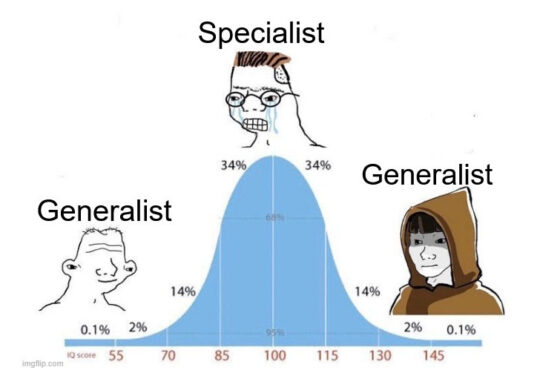
The Economics of Core Values: How to Make Better Calculations in the Marketplace of Your Mind
When Effort Drains Instead of Drives You
You’ve been told that fulfillment is about “balance.”
Balance your career and your family.
Balance work and rest.
Balance purpose and peace.
But balance isn’t something you manage.
It’s something your biology does automatically, through the invisible hand of your core values.
You don’t choose what’s important to you.
You inherit it.
Your genes and your environment wire you with certain **core values of being: ** Power, Independence, Curiosity, Acceptance, Order, Idealism, Family, Status, Tranquility, and more.
They form the fixed demand curve of your life.
No matter what you achieve, your mind keeps checking its dashboard, those internal gauges, to see which values are running low.
When one drops below its threshold, everything else fades. Motivation, focus, energy, all of it reroutes toward restoring equilibrium.
You can’t turn this off. You can only learn how it works.
The problem isn’t that you’re unmotivated.
It’s that you’re making poor economic calculations with your energy, investing in actions (your core values of doing) that don’t pay high enough returns in the currencies that matter most to your psyche.
And just like a bad investor, you might not realize you’re burning through your resources until the system crashes.
The Energy Trap of Misaligned Values
Most people are terrible at understanding their own economies.
They assume fulfillment comes from the outside (money, status, freedom) but they’re mistaking external currency for internal value.
Your true economy doesn’t care about dollars or recognition.
It only cares about whether your doing values are producing emotional profit in your being values.
That’s why success often feels empty.
You achieve what you thought you wanted, but your inner gauges don’t rise.
The ROI wasn’t there.
Imagine a trader who keeps doubling down on a bad stock because he’s emotionally invested.
That’s most people, investing time, energy, and reputation in pursuits that don’t yield emotional returns aligned with their innate demand structure.
The result?
Chronic fatigue.
Perpetual restlessness.
The quiet sense that life is running a deficit no matter how much you “earn.”
The Real Marketplace: Being vs. Doing
Your life runs on a constant exchange between doing and being.
Core Values of Being are the deep, genetically rooted desires:
Power, Independence, Curiosity, Acceptance, Order, Saving, Honor, Idealism, Family, Status, Vengeance, Romance, Tranquility.
They’re not optional. They’re needs.
Core Values of Doing are your means of production:
Physical Activity, Social Contact, Eating, Exploring, Hunting, Sex, Observing, Creating, Competing, Caretaking, Organizing, Analyzing.
They’re how you work to fulfill those needs.
When you perform a doing that fulfills a being value, you’re essentially completing a transaction.
You spend time, energy, or reputation, and receive emotional satisfaction in return.
The catch: not every doing produces equal ROI for every person.
Your genetic wiring determines your comparative advantage, your natural productivity in specific doings.
Some people are efficient “producers” of fulfillment through Creating. Others through Analyzing or Social Contact.
When your doing aligns with your innate strengths and fulfills your highest-value being desires, your system becomes self-sustaining.
You spend energy and get back more energy than you used.
That’s the holy grail of internal economics: a positive feedback loop between being and doing.
Leonardo da Vinci and the Self-Sustaining Economy
Leonardo da Vinci is the archetype of someone whose inner economy ran at perpetual surplus.
His doing values, Observing, Creating, Analyzing, Exploring, weren’t chores. They were his natural currencies of expression.
They directly fulfilled his being value: Curiosity, Idealism, and Understanding.
Every hour he spent experimenting, sketching, or designing was a profitable exchange.
His doing didn’t drain him because it produced the very fulfillment it was meant to serve.
Da Vinci’s genius wasn’t mystical. It was economic.
He found an energy loop where the cost of doing was the same action that produced his reward of being.
When your doing and being values align like that, motivation becomes effortless.
You don’t need discipline. You don’t need “grind.”
You simply do what you’re wired to do, and the returns fuel the next cycle.
The Cost of Misalignment
Now, imagine the opposite.
You’re working a job that requires constant Competing and Organizing to achieve a high level of Status.
But your core doing values are Observing and Analyzing.
You can grind through it for a while, but you’re burning energy on a production method that doesn’t suit your biology.
If the reward (Status or whatever core value you desire) doesn’t come fast enough or doesn’t fulfill you deeply enough, your system runs into an energy deficit.
This is the hidden risk in every doing→being strategy.
If the time horizon is too long or the ROI too low, you experience motivational bankruptcy: the effort required to maintain motivation exceeds the emotional reward you receive.
You might rationalize it, “I’m doing this for my family,” or “It’ll be worth it later.”
But your nervous system doesn’t care about rationalizations.
It only responds to emotional returns.
That’s why burnout feels so absolute.
You can’t “think” your way out of an energy deficit.
You can only change the structure of your economy, either by switching to a doing that fulfills you faster, or by adjusting your expectations for which being value you’re truly serving.
Rebalancing: Marcus Aurelius and the Stoic Ledger
Marcus Aurelius lived at the height of worldly power: Emperor of Rome, surrounded by wealth, status, and influence.
Externally, his economy was booming. But his Meditations reveal a man whose true core values were different.
For Aurelius, Power and Status were largely fulfilled, or perhaps never his true desires at all. This allowed him to turn inward and focus on fulfilling his next highest priority core value of being: Tranquility.
By securing or disregarding external rewards, he could direct his energy toward the values that genuinely mattered to him.
Fulfillment isn’t static. It’s cyclical.
Once one being value is satisfied, the system shifts its demand elsewhere.
Your psyche starts looking for the next imbalance to correct.
Understanding this turns frustration into feedback.
Instead of chasing perpetual satisfaction, you learn to read your internal market signals and rebalance toward what truly matters.
The Economics of Fulfillment
Let’s make the parallels explicit.
Every day, you have limited resources:
- Time (the nonrenewable asset)
- Energy (the fuel of production)
- Reputation (the social credit that unlocks opportunity)
- Attention (the currency of focus)
You allocate these resources among various doings in the hope of generating being fulfillment.
If you’re efficient, if your doings match your strengths and yield consistent returns, your internal economy grows.
You feel momentum.
If you’re inefficient, pursuing values that don’t fit your wiring or yield delayed rewards, your economy contracts.
You feel burnout, frustration, and existential debt.
The goal isn’t to maximize income.
It’s to maximize psychological ROI: the emotional profit you gain per unit of energy spent.
That’s why two people can spend the same eight hours working and end the day feeling completely different.
One invested energy into activities that fulfill their being values.
The other spent energy in a system that doesn’t recognize its own demand structure.
Why Genetics and Environment Set the Demand Curve
You don’t get to choose your core values of being.
Your evolutionary history and early environment set them.
They are the deep preferences your mind uses to decide what matters.
Trying to “manage” or “change” them is like trying to convince a market not to value gold.
It doesn’t work.
Instead, the key is to make better calculations, to understand what your psyche is actually demanding and allocate your doing energy accordingly.
For example:
If Tranquility is a high-value need for you, pursuing Power through endless competition is a poor economic decision.
If Idealism is one of your high-demand values, but you’re trying to fulfill it through a doing that drains you, say, constant social organizing, you might find a better return through Analyzing, Creating, or Teaching.
Your task isn’t to suppress your demands.
It’s to learn how to meet them efficiently.
The Holy Grail of Core Value Strategy
Some people discover a combination of being and doing that forms a closed-loop economy.
Their doing produces energy, not just spends it.
Da Vinci was one.
Modern creators, inventors, and thinkers who find intrinsic joy in their work are others.
When your doing aligns with your genetic advantage and fulfills your highest being value, you achieve perpetual motion.
You become a generator of your own motivation.
This is why certain careers feel “effortless” for some and impossible for others.
The energy cost of production depends on your alignment with your innate economy.
You can’t fake this indefinitely.
If your daily doing depletes your energy faster than your being values can replenish it, you will collapse, mentally, physically, or emotionally.
But when you find the right alignment, work becomes renewal.
You finish the day tired but fulfilled.
And you wake up with energy instead of dread.
That’s not magic.
That’s economic efficiency in its purest biological form.
Solution: How to Optimize Your Internal Economy
You can’t rewrite your demand structure, but you can improve your resource allocation.
Here’s how:
- Identify your high-demand being values.
What core values give you purpose in life? Those are your primary drivers. - Audit your doing values.
Which activities consistently energize you rather than drain you? Those are your most productive assets. - Match them for best ROI.
Combine your high-demand being values with your energizing doings.
For example, if Curiosity (being) and Creating (doing) both light you up, build your life around learning and making. - Accept the cycles.
Emptiness after achievement is just rebalancing, a signal that one market is saturated, and it’s time to invest elsewhere. - Track your emotional metrics.
Energy, enthusiasm, and tranquility are your indicators. When they decline, re-examine your allocations.
This is how you make better calculations, not through willpower or affirmations, but through intelligent economic design.
Key Principles
- Your demand curve is fixed.
You can’t choose your core values of being or doing; you can only recognize and honor them. - ROI determines sustainability.
Activities that fulfill your being values quickly and deeply yield the highest motivational returns. - Equilibrium is temporary.
Fulfillment is a moving target, once one value is satisfied, another takes priority. - Alignment creates perpetual energy.
When your doing values match your genetic strengths and fulfill your being values, motivation becomes renewable.
Key Takeaways
- You don’t manage your values; your values manage you.
- Motivation is the mind reallocating energy toward under-fulfilled core values.
- Every action is an economic transaction between doing and being.
- Efficiency is finding the shortest, most natural route from doing to being fulfillment.
- Burnout is simply a market crash, too much investment in a poor-yielding pursuit.
- The holy grail is alignment: doing what energizes you to fulfill what fulfills you.
- When you achieve that, you stop chasing balance, because your internal economy balances itself.
Fulfillment isn’t about finding peace once and for all.
It’s about learning the invisible economics of your own mind, so that every investment of time, energy, and attention compounds into a richer, more sustainable life.
Thanks for reading my stuff,
MJ




